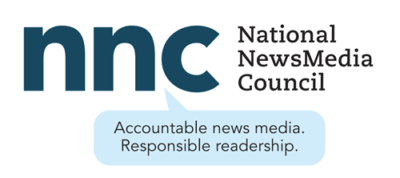 By Staff
By Staff
October 4th, 2021
BURLINGTON, ON
How many perspectives should be included in a brief news piece? When are letters considered an appropriate remedy to showing another side of an issue? These are questions that reporters and editors face every day as they exercise their editorial judgment to determine the angle of the story, the people interviewed, and the evidence used to provide an accurate account of events for readers.
The National NewsMedia Council recently reviewed a reader’s concerns about accuracy and lack of opportunity to present another perspective in a story about local pesticide use.

Exchanging different points of view – respectfully.
The article, published in an Ontario-based community paper, reported on residents’ reactions to a recent application of fungicide, via helicopter, to a cornfield in the area. The article featured comments from local residents expressing concern with the noise disturbance and proximity of the helicopter to their houses.
An individual in the agricultural industry expressed concern with the lack of perspective from farmers and other members of the agricultural community. In particular, the individual argued that the article suggested that the fungicide was “sprayed liberally on the native ecosystem around the field boundaries,” rather than used correctly by trained professionals.
In reviewing the article, the NNC observed that the comments were clearly the perspective of some residents and were attributed accordingly. The NNC found no evidence to support the claim that the article implied that the product was used incorrectly or outside the intended area.
 The brief article offered a summary of the concerns raised by residents about the application of the fungicide near their houses. All statements were attributed accordingly to the individuals quoted in the story.
The brief article offered a summary of the concerns raised by residents about the application of the fungicide near their houses. All statements were attributed accordingly to the individuals quoted in the story.
That said, we understand that the individual’s primary concern in this case was not being able to provide a different perspective and relevant information in response to the concerns raised by residents quoted in the article.
A subsequent edition of the local newspaper dedicated a section of its pages to reader reactions to the brief article.
In one article, the publisher alerted readers to the different—and often strong—perspectives on the published piece and other issues at hand. The edition included a published response from the complainant as well as several letters to the editor and other comments in response to the story.
In this case, the NNC considered the news organization’s decision to publish responses to the article to be consistent with best practices in addressing reader concerns, and found the issue resolved. The significant attention devoted to reader responses provided opportunity to show a range of opinions in the community, from farmers and those outside the agricultural industry.
Letters to the editor offer opportunities to clarify or provide different perspectives on information and opinions presented in articles. In this way, they can often serve as a remedy to concerns raised by readers, and showcase the breadth of opinions held by members of a community.
The Gazette has taken a slightly different approach with its comments section. On many stories there are close to a dozen comments – some very well informed, others not as well informed as they could be.
In the past six months we have found that some commenters ride an issue pressing their view again and again. We no longer approve those comments.
We are also finding that people are writing a comment without identifying themselves and using a phony email address.
Then there are others that are rude and uncivil.
We have in the past told commenters that they need a break and suspend the privilege they have for a period of time. We have had to completely suspend one commenter.
Going forward we will stiffen the requirement for people to comment.
Behind all this is a belief that informed citizens can make informed decisions and that no matter what the leadership in Burlington do they must be both accountable and transparent.



















The labelling of anyone, without proof, who disagrees with a viewpoint is also an issue and diminshes the discourse and credibility of the BG. Requiring full-name disclosure, would go a long way to cleanning this up.
Editor’s note: We don’t disagree with you on this – however it takes time to make the phone calls and check on the identity. We are limited in terms of resources – but that policy will be put in place in the very near future.
Sound comments Penny.
Speaking for myself only. The Burlington Gazette gives readers the opportunity to comment on a reported subject.
I respect the fact that others differ in their opinion than mine and it is always important to listen to all sides. The one thing I don’t think is appropriate is when people who comment chose to disparage the person commenting rather than refute their position.